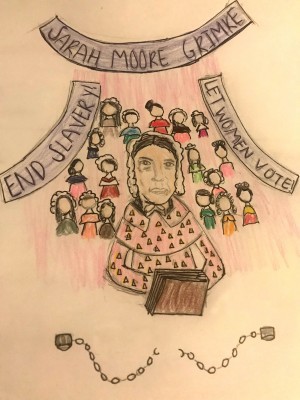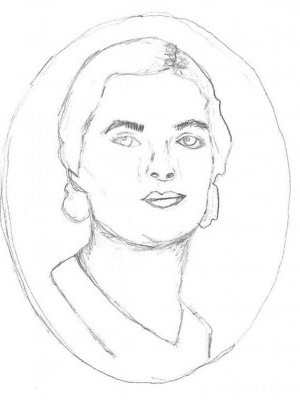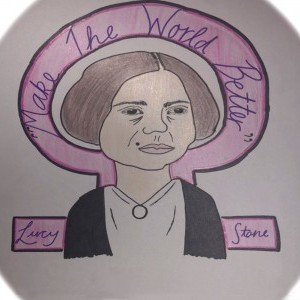Cate Goodrum, Allison Owem, Alexandra Bennett, Isabel Hall & Natalie Hernandez
St Cecilia Academy | Nashville, TN | 11th Grade
Historical Figure I admire
Jane Addams
Jane Addams was born on September 6,1860 in the small farming town of Cedarville, Illinois. Her parents were John Huy and Sarah Weber Addams. Jane Addams was the eighth child out of nine. However, only five of the children survived infancy and her mother died in childbirth when Addams was two years old. Her father owned a successful mill, was a local politician, fought in the Civil War, and was friends with Abraham Lincoln.
Addams grew up in a wealthy family with liberal Christian values and a strong sense of social mission. She graduated from Rockford Female Seminary in 1881 and was top of her class. Addams wanted to use her education to help others, so she attempted to study medicine for the next six years. However, she was in London with her friend Ellen Gates Starr in 1888 and found her true calling when they visited Toynbee Hall, a settlement house on the city's East End. This house helped poor industrial workers with anything they needed. Addams wanted to bring this to the United States, so she and Starr founded the Hull House in Chicago's poor, industrial west side, which was the first settlement house in the United States. Addams wanted the goal to be that educated women could share their knowledge with the poor people in the city. This settlement house provided many services such as, a kindergarten and daycare for working mothers, job training, English language and cooking classes, community center, gymnasium, and an art gallery. Addams wanted to expand her efforts to improve the society by successfully pushing for the establishment of a juvenile court system, better urban sanitation and factory laws, protective labor legislation for women, and more playgrounds and kindergartens in Chicago.
In 1907, she was one of the founding members of the National Child Labor Committee. This played a significant role in passing the Federal Child Labor Law in 1916. Also, Addams led an initiative to establish a School of Social Work at the University of Chicago that created support for a new profession for women. She served as president of the National Conference of Charities and Corrections from 1909-1915. Addams was the first woman to hold this title and became active in the women's suffrage movement as an officer in the National American Women's Suffrage Association. Addams was also one of the founders of the National Association for the Advancement of Colored People (NAACP). During the time of World War I, Addams promoted international peace by protesting US entry into World War I. She believed that people could solve disputes without violence. Addams joined a group of women peace activists who hoped to bring peace. In 1915, she was ahead of the Women's Peace Party and also became president of the International Congress of Women. Addams loved to write articles and give speeches all around the world to promote peace. Furthermore, she helped found the Women's International League for Peace and Freedom in 1919, where she was president for ten years. Addams was awarded the Nobel Peace Prize for her efforts in 1931 and was the first American woman to receive this award. She wrote a book about her work at the Hull House in Chicago and she wrote other books about her promotion of peace. Jane Addams died on May 21, 1935, from never fully recovering from a heart attack in 1926.
Historical Figure I Admire
Hedwig Dohm
During the fight for Women’s Suffrage, many women took a stance all over the world to fight for their rights to vote. Hedwig Dohm was part of this movement. Dohm was born on September 20th, 1931 in Berlin, Germany to Gustav Adolph Schlesinger and Henriette Wilhelmine Julich. She was the fourth of eighteen children and grew up living in her brothers’ shadows when it came to education.
As a young girl, Dohm did not have access to education, and "envied the education her brothers received while her unsupportive mother forbade reading and locked their books in a cupboard.” (Hedwig Dohm, 1833-1919). Dohm was able to attend an all-female school until the age of 15, when she was forced to return home in favor of continuing her needlework. In school, Hedwig often felt "hopelessly under-challenged.” (Biography Hedwig Dohm). Upon turning 18 she once again had the opportunity to return to school for a teaching certificate, but was unable to continue her formal education upon her marriage to Ernest Dohm.
It wasn’t until 1872 when Hedwig Dohm took up writing after the raising of her five children. In her writing she was often described as a radical feminist and wrote heavily about women’s suffrage and emancipation. From 1872 to 1879, Hedwig wrote her first four feminist essays: "What Pastors Think Of Women", "Jesuitism In The Household," "The Scientific Emancipation Of Women" and "Women's Nature And Law". She continued her writing career with several comedies that were and are successfully performed in Berlin, and published poetry anthologies. Hedwig Dohm never fully engaged in Women’s organizations, but supported them heavily. She supported more women’s movements when they became more radical.
Overall, Hedwig Dohm stood as an inspiration to all women when it came to gaining rights for an education and equal rights. She grew up understanding women did not have the rights they should and sought to change this through her writings. Her initial goal was to ensure that women were proud of their gender and could be someone in society. Hedwig Dohm’s initial goal turned out to have a more compelling message during the Women’s Suffrage Movement.
SOURCES +
What the Project Means to Me
The right to vote as an American woman is a battle our ancestors fought for us to have. All levels of voting are important; federal, local, and state. The right to vote federally, as Americans, gives us the power, as U.S. citizens, to help decide who we want to represent our country and be a strong leader. Federal voting is important because we can put our opinion in and have the choice to help who the President or Vice President of the United States of America will be for the next four, or if re-elected, eight years. I cannot stress enough how important federal voting is. The President’s primary duty is to make sure all U.S. laws are carried out and that the federal government runs efficiently. He oversees foreign policy, can veto bills already passed, and is the leader of military forces.
Local voting is also important because the citizens elect a person who they believe can impact and influence the citizens’ lives. Electors are also accountable for being a perfect leader of democracy. If as a U.S. citizen, we fail to vote locally, we are not participating in trying to create a perfect democracy.
State voting gives citizens the opportunity to vote early regarding any upcoming election. This is important because if you are unable to vote on voting day, you can put in your ballot early.
I personally believe that as a citizen of the United States, every adult should vote to decide the future of our country. Those who do not vote and complain about who wins the election, are hypocritical. If you want to make an impact for the leader of our country, you must take the extra time to vote. I find it aggravating when people complain as adults who won a certain election but did not take the time to add in an extra vote for who they were in favor of.
Being able to vote as a citizen of the United States is one of our rights and therefore, we should participate in deciding the future of our country and local area. You, as an American citizen, have the right to vote when you turn eighteen. Use it! Not everybody can have a voice in the government.
Deadline Extended
There's still time to join Women Leading the Way.
Become a part of our storytelling archive. Enroll your class today.
Join the Project



